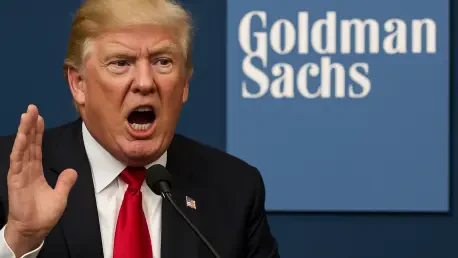In a series of fiery public statements that have reverberated through the financial world, President Donald Trump has launched a barrage of criticisms against some of the most influential figures and institutions in the economic sphere, with Goldman Sachs emerging as a primary target of his discontent. Through pointed social media posts on Truth Social and direct remarks on policy matters, Trump has taken aim at Goldman’s CEO David Solomon, chief economist Jan Hatzius, Federal Reserve Chair Jerome Powell, and even former Treasury Secretary Steve Mnuchin. These attacks are not merely surface-level disagreements over numbers or forecasts; they reveal a profound frustration with economic policies and predictions that Trump views as misaligned with his vision for America’s future. The personal nature of his critiques, often laced with sharp jabs, has sparked intense discussion across the financial sector about the potential ramifications of such rhetoric on market stability and the autonomy of key institutions.
Challenging Economic Narratives
The core of Trump’s recent criticisms centers on economic forecasts that he perceives as undermining his policy agenda, particularly those emanating from Goldman Sachs. Specifically, Trump has zeroed in on chief economist Jan Hatzius for research suggesting that U.S. consumers are increasingly bearing the cost of tariffs, a claim that conflicts with Trump’s assertion that foreign governments and companies absorb most of the financial burden. This disagreement is more than a technical dispute; it highlights a fundamental clash between data-driven analyses from major financial entities and the narrative Trump seeks to promote. As tariffs continue to play a significant role in trade policy, with revenues reportedly reaching substantial figures, the debate over who truly pays the price remains a contentious issue. Financial analysts note that such public disputes can create uncertainty among investors, who rely on consistent and credible data to make informed decisions in an already volatile global market.
Beyond Goldman Sachs, Trump’s frustration extends to the Federal Reserve and its leadership under Chair Jerome Powell, whom he accuses of mishandling critical monetary policies like interest rates. Trump has openly demanded aggressive rate cuts, arguing that delays in such actions hinder economic growth, while also criticizing Powell for unrelated issues like over-budget renovations of Federal Reserve facilities. This persistent pressure on the Fed raises questions about the independence of monetary policy, a cornerstone of economic stability in the United States. Trump’s hints at potential legal action against Powell further intensify concerns among policymakers and economists, who fear that political interference could erode the central bank’s ability to operate free from external influence. As debates over interest rate adjustments continue, with some Treasury officials reportedly aligning with Trump’s call for significant cuts, the tension between political demands and institutional mandates remains a critical point of focus for the financial community.
Personal Attacks Amid Policy Disputes
Trump’s approach to criticism often veers into personal territory, as seen in his pointed remarks about Goldman Sachs CEO David Solomon, whose past hobby as a DJ has become fodder for mockery. Trump has suggested that Solomon might be better suited to spinning records than leading a major financial institution, tying this personal jab to broader dissatisfaction with Goldman’s economic predictions. Notably, a forecast from a couple of years ago that suggested a Democratic electoral win would boost economic growth while a Trump victory could lead to a downturn has fueled his ire. This blend of personal insult and professional critique underscores a pattern where policy disagreements are amplified by individual grudges, creating a charged atmosphere that extends beyond boardrooms to public perception. Such rhetoric risks overshadowing substantive discussions on economic strategy, potentially alienating key stakeholders in the financial sector.
Equally striking is Trump’s scorn for former Treasury Secretary Steve Mnuchin, whom he faults for recommending Jerome Powell as Federal Reserve Chair several years ago. Using derogatory nicknames and harsh language, Trump has framed Mnuchin’s past counsel as a significant misstep, reflecting a tendency to revisit old decisions with bitterness. This personal animosity adds a layer of complexity to Trump’s broader narrative of being let down by financial elites, even those who once served in his administration. The focus on past grievances, rather than current policy contributions, shifts attention away from pressing economic challenges and toward a more vindictive style of leadership. Analysts observing this dynamic suggest that such personal attacks could strain relationships with former allies, complicating efforts to build consensus on critical fiscal and monetary issues at a time when unity is essential for navigating economic headwinds.
Political Leverage Over Financial Institutions
The potential consequences of Trump’s criticisms are not limited to words; they carry significant implications for the business prospects of major financial institutions like Goldman Sachs. There are indications that Trump’s displeasure could result in Goldman being sidelined from high-profile government projects, such as the potential initial public offering of Fannie Mae and Freddie Mac. Meetings with other prominent bank CEOs, including Brian Moynihan of Bank of America and Jamie Dimon of JPMorgan Chase, further suggest that personal and political disagreements might directly influence which institutions secure lucrative government contracts. This raises serious concerns about fairness and the role of political favor in economic dealings, as banks may find themselves navigating a landscape where loyalty to certain narratives could outweigh merit or expertise in securing opportunities.
Additionally, Trump’s influence extends to broader policy actions that aim to reshape financial practices through political means, most notably an executive order targeting what he describes as “politicized or unlawful” debanking practices. By accusing major banks of unfairly targeting conservative individuals or entities, this directive seeks to align financial operations with specific ideological goals, further blurring the boundaries between governance and business. Such moves have sparked debate among industry watchers, who argue that political leverage in financial regulation could undermine the impartiality needed to maintain trust in the banking system. As economic policies increasingly intersect with political agendas, the risk of creating a fragmented financial environment grows, potentially impacting everything from consumer confidence to institutional stability in a highly interconnected global economy.
Risks to Institutional Autonomy and Trust
One of the most concerning aspects of Trump’s recent actions is the apparent threat to the independence and credibility of key economic institutions, particularly evident in changes at the Bureau of Labor Statistics. The dismissal of Commissioner Erika McEntarfer and the subsequent nomination of E.J. Antoni, an economist affiliated with the Heritage Foundation, have raised alarms among analysts across the political spectrum. Critics contend that prioritizing political loyalty over analytical rigor in such appointments could compromise the accuracy of vital economic data, which serves as a foundation for policy decisions and market assessments. At a time when clear, reliable statistics are crucial for addressing challenges like rising consumer prices, any perception of bias in official reporting could have far-reaching consequences for public trust and economic planning.
Furthermore, the chilling effect of Trump’s rhetoric on financial analysts and institutions cannot be overlooked, as some professionals express reluctance to speak candidly due to fears of political backlash. Reports indicate that certain high-profile analysts are opting for self-censorship to protect their firms from potential repercussions, a trend that stifles open discourse on economic matters. While some investment experts argue that Trump’s comments should not significantly sway market decisions, the broader concern remains that sustained political pressure could erode the objectivity necessary for robust economic analysis. As financial leaders navigate this delicate balance, the tension between maintaining institutional integrity and responding to political currents continues to shape the landscape, with implications for how economic policies are debated and implemented in the public arena.
Reflecting on Economic Tensions
Looking back, President Trump’s sharp criticisms of financial leaders and institutions like Goldman Sachs marked a period of heightened tension between political rhetoric and economic realities. His pointed attacks on figures such as David Solomon, Jan Hatzius, Jerome Powell, and Steve Mnuchin often blended policy disagreements with personal vendettas, creating a volatile environment for those shaping America’s financial future. The disputes over tariff impacts, interest rates, and economic data credibility underscored deeper challenges in maintaining institutional independence amidst political pressure. As the dust settled, the potential exclusion of major banks from government projects and the chilling effect on analysts’ free expression stood as stark reminders of the tangible impacts of such rhetoric. Moving forward, stakeholders were urged to prioritize dialogue over division, seeking ways to rebuild trust in economic data and ensure that policy decisions reflect sound analysis rather than political expediency.









